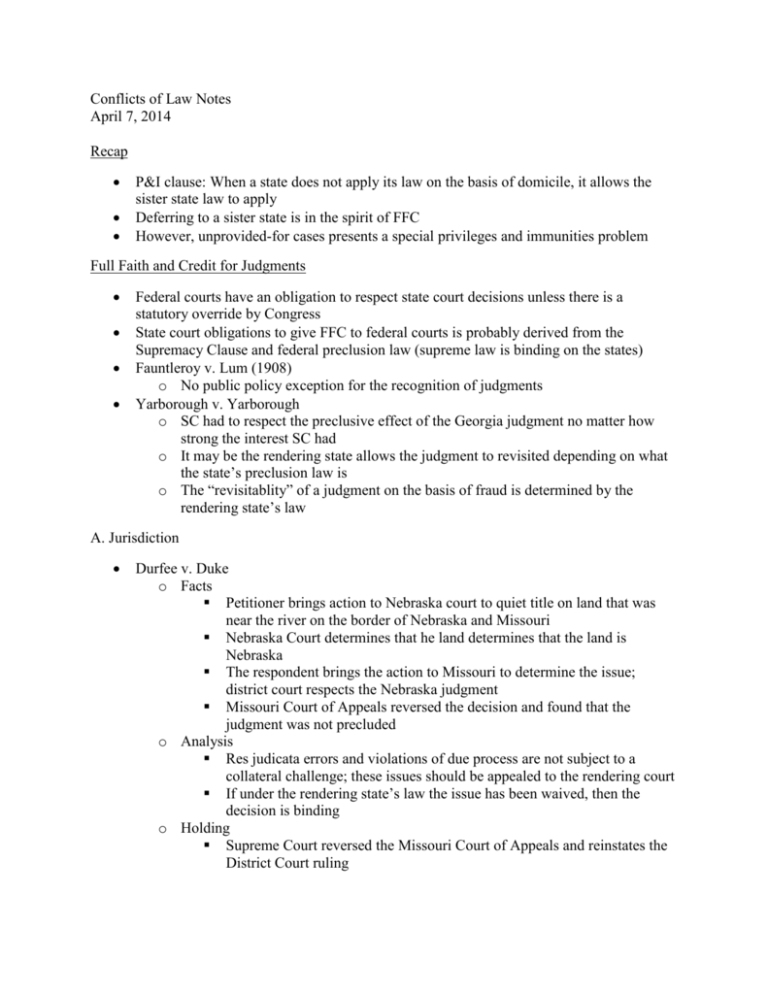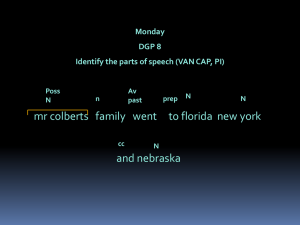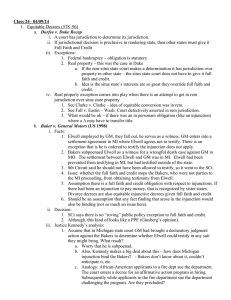Notes
advertisement

Conflicts of Law Notes April 7, 2014 Recap P&I clause: When a state does not apply its law on the basis of domicile, it allows the sister state law to apply Deferring to a sister state is in the spirit of FFC However, unprovided-for cases presents a special privileges and immunities problem Full Faith and Credit for Judgments Federal courts have an obligation to respect state court decisions unless there is a statutory override by Congress State court obligations to give FFC to federal courts is probably derived from the Supremacy Clause and federal preclusion law (supreme law is binding on the states) Fauntleroy v. Lum (1908) o No public policy exception for the recognition of judgments Yarborough v. Yarborough o SC had to respect the preclusive effect of the Georgia judgment no matter how strong the interest SC had o It may be the rendering state allows the judgment to revisited depending on what the state’s preclusion law is o The “revisitablity” of a judgment on the basis of fraud is determined by the rendering state’s law A. Jurisdiction Durfee v. Duke o Facts Petitioner brings action to Nebraska court to quiet title on land that was near the river on the border of Nebraska and Missouri Nebraska Court determines that he land determines that the land is Nebraska The respondent brings the action to Missouri to determine the issue; district court respects the Nebraska judgment Missouri Court of Appeals reversed the decision and found that the judgment was not precluded o Analysis Res judicata errors and violations of due process are not subject to a collateral challenge; these issues should be appealed to the rendering court If under the rendering state’s law the issue has been waived, then the decision is binding o Holding Supreme Court reversed the Missouri Court of Appeals and reinstates the District Court ruling Subject matter jurisdiction and personal jurisdiction are similar subject to a few exceptions o Personal jurisdiction is waived very early o Subject matter jurisdiction takes more effort to be waived and can generally be brought up at any time except a collateral attack of a judgment in which the defendant did not default Exception in which a collateral attack for lack of SMJ was allowed Kalb v. Feurestein o Foreclosure proceedings was not given FFC because of a bankruptcy action was pending, which deprived the rendering state of jurisdiction o Exclusivity of a bankruptcy court and the whole set of actions have to be brought before the bankruptcy court o This overrides the FFC obligation that federal courts would normally would give to state courts B. The Land Taboo Clarke v. Clarke o SC treats will and the property disposed of therein as personalty and to divide property located in Connecticut o Connecticut court treats the property as real property and does not give preclusive effect to the South Carolina judgment of equitable conversion o Similar to the Fauntleroy case where an error judgment was made by SC, which would not be enough to have FFC challenge o However, the court determines that Connecticut had exclusive jurisdiction over the real property in Connecticut, and Connecticut did not have to give preclusive effect to South Carolina’s judgment o This is a crude exception to preclusion law – a party may always bring a judgment before the situs state with regard to real property Fall v. Eastin o Washington Court orders husband to deed property to wife o Also has a commissioner of court execute a deed transferring o Husband transfers the property to his sister (fraudulent conveyance) in Nebraska o Wife brings suit against the sister and Nebraska states that sister owns the property and will not give FFC to the Washington decision o The Supreme Court affirms the Nebraska Court o Washington trying to change the person who owns the property in Nebraska was ineffective and should have been done by the situs state o Dicta - The wife could have sued the husband for money damages because of the injunction against the husband o Concurrence - Holmes focuses on the fraudulent conveyance that occurred and thought Nebraska’s decision encouraged such conveyances, but did not think this was a FF&C problem Compare Fall with Clarke o It is puzzling that there was no in personam obligation on the daughter determined by South Carolina court that should have been respected the Connecticut o Perhaps the equitable conversion is what controlled (something like an action in rem) o Situs state would have to respect in personam obligations of the party’s o Renvoi may also be limited as a result of this decision C. Equitable Decrees Baker v. Gen Motors o Facts Elwell agreed to appear as a witness against GM in several proceedings Elwell had reached a settlement agreement with GM in his own action against GM in Michigan Michigan grants an injunction against Elwell against offering his services to testify GM moves to block Elwell as a witness in the present case in Missouri but not to enforce the injunction o Settlement agreement – breach of contract and claim preclusion could be brought up if a person tried to sue in another court on the same issues Judgment pursuant to settlement agreements may be treated differently from normal judgments o Issue: Is the injunction entitled to FFC? And also what does this mean? Injunctions are always revisable because of change in circumstances and that change the party’s ability to uphold the obligation Is the injunction granted by Michigan revisable by Missouri? Court may use this as an escape device and avoid its FFC obligations





